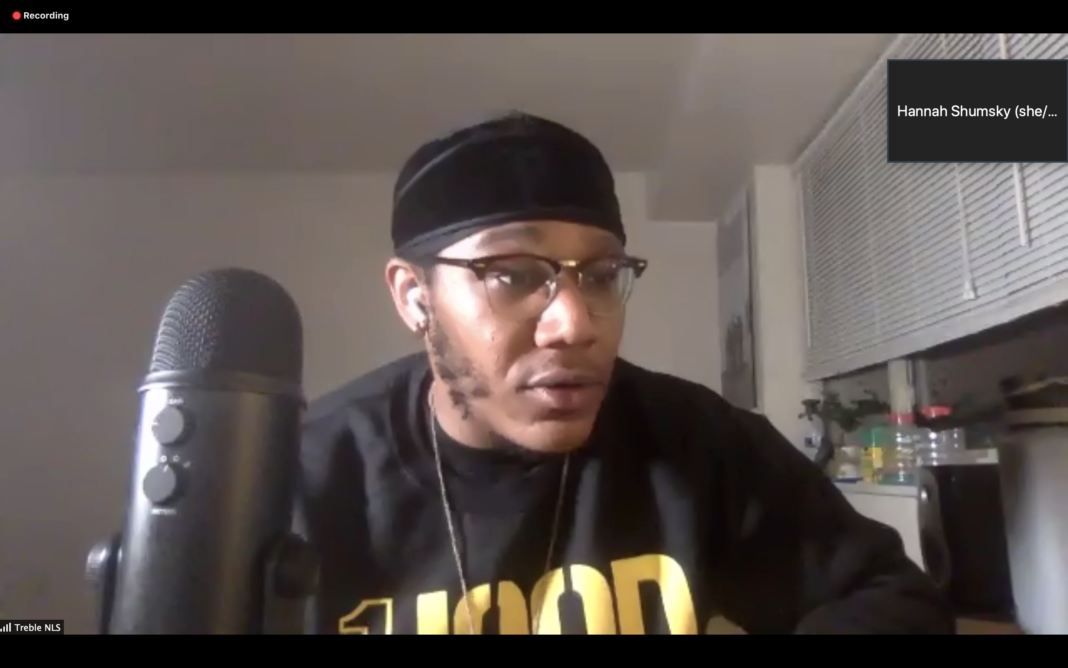As part of an event to address Black Lives Matter, police reform and improving community care or alternative crisis response methods, the gender studies program and Gender Studies Club hosted “Defund the Police? Creating Community, Communication and Care,” a Zoom panel with approximately 90 participants on Tuesday night.
As the third part of the “Deconstructing Capitalism” panel series, the two organizations brought together four panelists from across the country to discuss police funding and reallocation, a conversation brought to light after the killing of George Floyd by police in May.
The four panelists include Brittney Chantele and Treble NLS (which stands for “Never Lose Sight) who are both activists and musical artists from the Pittsburgh area. Chantele is a military veteran who at one time wanted to be a police officer, but declined her acceptance to the Pennsylvania State Trooper Academy after Michael Brown, an 18-year-old Black man, was shot by a police officer in Ferguson, Michigan in August 2014.
Robert Harris represented the Los Angeles Police Department (LAPD), an organization he has previously served for 20 years. He currently serves on the board of directors and has lobbied and advocated for police funding and the police profession.
Lieutenant Craig Lally from the LAPD was also invited as a panelist, but stepped away from his computer camera after his introduction.
Tim Black works at Crisis Assistance Helping Out On The Streets (CAHOOTS) in Eugene, Oregon. CAHOOTS was launched in 1989 as a “community policing initiative” and uses two-person teams consisting of a crisis worker with mental health field experience and a medic, such as a nurse or EMT. These teams are trained to respond to mental health crises, including conflict resolution, substance abuse and suicide threats. According to the CAHOOTS website, none of the staff are law enforcement officers and do not carry weapons.
Cindy LaCom, director of the gender studies program, moderated the panel.
Treble NLS stated that he has two goals as both an activist and protester: to make sure everyone is seen as a human being and treated as such and to make sure funds are reallocated to organizations or community-based organizations
“I can’t speak for all protesters, but me as a protestor, when I hit the streets, I’m hitting the streets because I’ve seen how many people were not treated like human beings,” Treble NLS said. “I’m seeing a lot of people who were in situations that could have been de-escalated and could have had a better turnout than they did.”
Harris, as a member of the LAPD, is against defunding the police, especially as there are more expectations for performance from the police.
“Where I think that we might split a little bit on this is anytime you’re asking somebody to perform at a high level, or if your expectations of performance are increasing, you don’t take funds and resources from them,” Harris said.
Harris also said that regaining the public’s trust of police and ensuring encounters between the public and police are grounded in mutual respect should be the end goal for a path forward.
In 2019, Harris said the LAPD had 1.6 million public interactions, which include a call for service, a mental health crisis and officer-initiated contact. Of these interactions, the LAPD used force “in a serious nature” 53 times, Harris said.
“I think that speaks to the quality of training that our officers get as well as the stringent, strong policies that we put in place and trying to address implicit bias, really highlighting de-escalation and things like that,” Harris said. “I think we can be a model as we move forward for the rest of the country, and I just wanted the opportunity to share what we’ve done well here in L.A.”
Although CAHOOTS is located over 2,500 miles from Slippery Rock, Black said his involvement in the panel was to show that mental health and housing poverty are systemic issues and that smaller communities can learn from actions taken in other communities.
“I think that is it important for us to learn from other communities about what approaches are being taken, what’s working and what isn’t,” Black said. “What I would like to see out of a further conversation is more inclusion of the local voices.”
Chantele concluded that some Black Lives Matter protestors have an unrealistic expectation that the police will be abolished.
“We need to find ways to understand each other because there were things said on this call where you can, I don’t know if other people picked up on it, but there is just a severe misunderstanding, and I think a lot of it comes from a lack of experience within other people’s situations or how they grew up,” Chantele said. “We cannot move forward and get on the same playing field until we take the time to open up our minds, be empathetic and hear each other out on each other’s side because there are reasons on why we have these standpoints, and they can so deep.”
The fourth panel in the “Deconstructing Capitalism” panel series is called “Queering relationships: Polyamory, Stigma and Resistance” and will take place via Zoom on Tuesday, Nov. 10 at 7:30 p.m.
Editor’s note (10/31/2020 at 2:40 p.m.)
In a follow-up message sent to the author of this piece following its initial publication, Chantele said that she believes the abolish of police won’t happen tomorrow, but believes that abolishing the police is reachable.
“I meant more so that it won’t happen tomorrow,” Chantele said in a direct message. “I think a lot of people believe the abolishment of the police can happen overnight. And I believe it will take some time and more people to come together to make those demands.”








